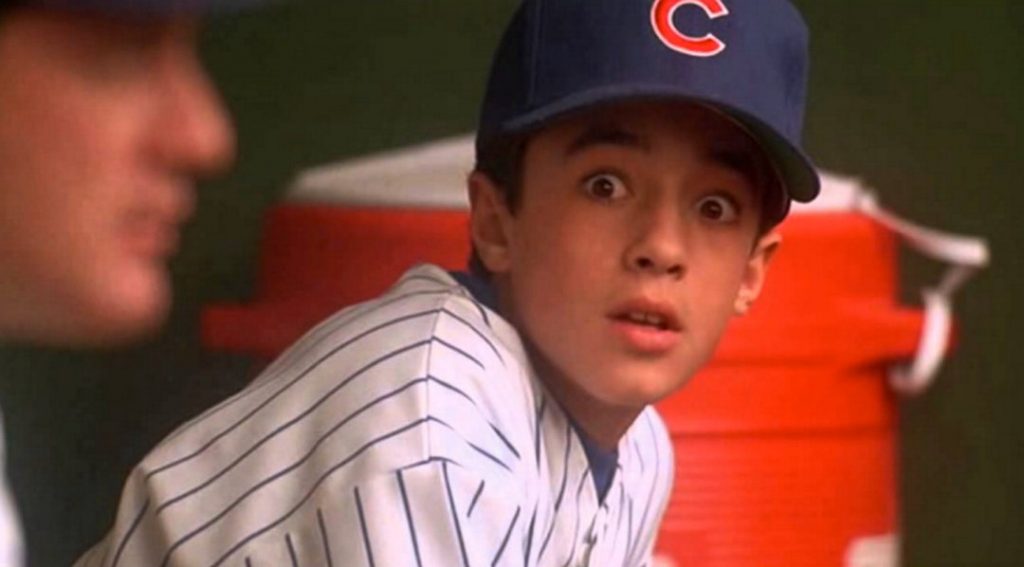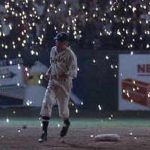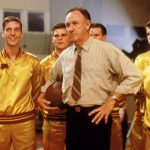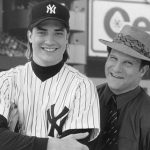 This one’s for the parents, because they know the drill. You have to put a movie on for the little ones. Rookie of the Year is readily available to stream. The kids like baseball. The movie is technically about baseball. And…hey…the kids LOVE Rookie of the Year. Why wouldn’t they? It’s for them at its heart, and it teaches the one good lesson that kids are supposed to get out of sports movies aimed at them: Keep dreaming, because you never know.
This one’s for the parents, because they know the drill. You have to put a movie on for the little ones. Rookie of the Year is readily available to stream. The kids like baseball. The movie is technically about baseball. And…hey…the kids LOVE Rookie of the Year. Why wouldn’t they? It’s for them at its heart, and it teaches the one good lesson that kids are supposed to get out of sports movies aimed at them: Keep dreaming, because you never know.
Well, one thing I do know: This movie is going to go on the screen and I’m going to roll my eyes a few dozen times, throw my hands up on a few other occasions, facepalm once or twice and then get a lecture from my wife about how “it’s just a silly movie,” and “the kids don’t need to understand why that scene isn’t realistic” and “you’re ruining their fun by talking too much about baseball” and so on and so forth.
Sports, we all know, are the ultimate reality show. Anything can happen, and it usually does. With a sports movie, you have to go into it accepting there will be some sort of manufactured magic that will propel the story to the finish line. Field of Dreams had the ghosts. The Sandlot had the mystique of a special bond of friends together during an unforgettable summer. Major League had the chemistry generated by a band of misfits. All completely plausible (if you believe in ghosts).
Ghosts are imminently more believable than what happened with 12-year-old Henry Rowengartner in Rookie of the Year.
Rowengartner opens the movie as a Little Leaguer and, to be frank about it, he’s a worse player than your average Little Leaguer. Like, so bad that he can’t even get off the bench. He’s the 11th guy on an 11-man team. Even with mandatory innings minimums common in Little League back then, the coach is reticent to use this kid until, due to injury and a few other managerial mishaps, he has to put him in as the right fielder.
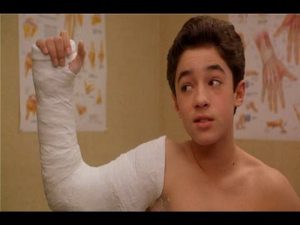
Somewhere in that cast on Henry Rowengartner’s right arm, tendons are somehow tightening. Baseball history is in the offing.
As if on cue, the first ball is hit to poor Henry, who immediately loses track of it, trips, falls, gets his hat somehow stuck in front of his eyes, gets confused and throws the ball over the outfield fence. It’s a sad display, and Henry’s confidence is shattered. He loves baseball, but he can’t be further from the big leagues, even if he somehow magically develops Aroldis Chapman’s in-his-prime heater.
(Which, he will. Just wait for it.)
This movie goes on to undo the lesson youth sports strives so hard to teach kids around the world: You don’t have to work hard to achieve your dreams. You just have to fail badly enough, and those dreams will come to you. One afternoon at school, Rowengartner slips on a baseball attempting to catch a fly ball, breaking his arm as he crashes to the ground. It will be more than a month before he can get back to riding pine.
Somehow during that time, Henry’s broken arm didn’t heal properly. The official diagnosis from the doctor: Tendons that healed a bit too tightly. How that happen with a broken arm, we may never know. But, we’re asked to believe it. Essentially, whatever happened turned Rowengartner’s right arm into an absolute bazooka. He and his friends get bleacher seats at Wrigley Field for a game, and when he catches a home run ball and throws it back, the throw almost reaches the catcher.
Of course, that gets noticed in the front office, and the rush to sign a 12-year-old to a major league contract is on. A few days later, Rowengartner is a Chicago Cub.
It’s at this point that we should mention that much of the rest of this story is exactly the same as every other bad baseball movie you’ve ever seen. Henry is the son of a single mother, who simply hasn’t met the ballplayer with whom she’ll inevitably fall in love. But, she is dating a sleazeball who sees Henry throw and sees dollar signs. He’ll become Henry’s de facto agent. You also have my favorite stereotypical sports movie character: The aging, drunken former star who is at the end of his career and lacks any kind of perspective outside the game. That’s Chet “The Rocket” Steadman, played by Gary Busey who appears to have taken a whole day’s worth of throwing lessons from Mackey Sasser to prepare for the role. In the obligatory role of eccentric, nonsensical pitching coach Phil Brickman: The classically trained Daniel Stern.
Due to his arm mutation post-break, Rowengartner has the ability to pump 103 mph fastballs. And, of course, the Cubs — in last place as the season winds down — strive to make a buck or three off that by throwing a pre-teenager on the major league roster. Forget the fact that any ball put in play against a pitch thrown at that velocity puts Henry in grave danger. Little League coaches were reticent to throw him into right field after all, so his reaction time and ability to glove the ball hit with a 100-plus mph exit velocity didn’t exactly inspire confidence that he’d be able to protect himself. But hey, Wrigley was sold out. So throw the kid in.
And in his debut…the kid was pretty bad. He gives up a home run and almost blows the save. But Steadman calms him down afterward and Rowengartner starts to pitch better. We know this because a well-placed video montage shows him striking out Barry Bonds and Bobby Bonilla. Not bad for a 12-year-old with no earthly idea how to pitch, no secondary offering and a complete inability to field his position.

Chet “The Rocket” Steadman, former star, future Little League coach.
Somehow, though, he’s getting by on poor sportsmanship disguised as pure guile. Manager Sal Martinella, in a moment of pure incompetence at Dodger Stadium, backs himself into a spot where he has to let the 5-foot-nothing Rowengartner bat against a Dodgers right-hander played by the 6-foot-7 former Yankees reliever Tim Stoddard. Stoddard walks Rowengartner, then falls for the little punk’s “Pitcher’s got a big butt” taunt. Of course, Henry comes around to score, partly because Stoddard completely lost his mind and gave him a free base after plunking the next hitter. All the while, Rowengartner’s mother is at home — in Chicago — listening to the game from work. While her 12-year-old son is hanging out with a major league baseball team in Los Angeles. Makes sense.
Behind the scenes, things are happening. Jack Bradfield, Rowengartner’s mother’s initial love interest, is making Henry a star. We know this because he got him a part in a Diet Pepsi commercial with Ray Charles. Young Rowengartner has become quite a sensation, as you could imagine. So much so, that the two people in the movie with any sense — Bradfield and Larry “The Fish” Fisher, who I believe is the Cubs’ general manager, because he seems to have a GM’s authority.
Bradfield and Fisher have a deal in place to trade Rowengartner to, of course, the Yankees, who will sign Henry to a lucrative, long-term contract*. Rowengartner doesn’t know about this, because he’s just a kid who wants to play for the hometown Cubbies. Rowengartner’s mother is none the wiser, either, because she’s getting stuck on Steadman, whose Bradfield wants to force into retirement (which wouldn’t be a bad move for the Cubs, either, because Steadman has worse arm speed than pre-injury Henry). Most importantly, Cubs owner Bob Carson didn’t know, and he’s not going to like it because Rowengartner has somehow propelled the Cubbies from dead last into first place in the NL West in a matter of, oh, about a month.
*The only realistic scene in this movie is the one where the early-90s Yankees would trade for a 12-year-old kid and hand him millions of dollars. That would have been par for the course back then, another banner day for The Boss. (Incidentally, in real life, New York did make a deal that involved the Cubs in the summer of 1993, when the movie hit theaters; They obtained lefty reliever Paul Assenmacher, who at least was 20 years Rowengartner’s senior.)
In an interesting turn of events, we learn soon enough how lucky Henry was to have a stable, parental figure like Steadman in his life. His mother unwittingly signs the agreement — she literally did not read a legal document pertaining to her son’s career before signing it — sending him to the Yankees. So, in a very legal sense, that deal is done. This movie is named Rookie of the Year, because it could not have been named Mom of the Year.
Anyway, after Henry and his mother find out he’s going to be a Yankee, they freak. Henry retired, effective at season’s end, to focus on spending more time with his friends, who got jealous of his success and shut him out of their humdrum lives because he didn’t have as much time to spend with them building a stupid boat because he was pursuing his dreams of being an actual major league baseball player. Carson says he never approved the trade anyway, which should have been moot, because two sides agreed and the mother signed the approval herself. By rights, Rowengartner should have finished the season a Yankee, but whatever.
The Fish, who agreed to get the Yankees to take a 12-year-old pitcher off their hands, somehow was demoted to selling hot dogs.
The Cubs and Mets meet in the last game of the regular season, with a division title on the line for the Cubs, and Steadman somehow gets the ball despite pitching so horribly down the stretch that the Cubs tell him his contract won’t be renewed. Looking to go out on a high note, The Rocket pitches…OK. He leaves with the lead after six, but his arm is completely obliterated after he tags a Mets runner out at home. Of course, Martinella calls on the seventh grader to get a nine-out save.
And, it looks like it’s going to work. Rowengartner pumps heater after heater, strike after strike against the Mets, and the Cubs take the lead into the top of the ninth. Martinella takes a deep breath and smiles, finally letting himself settle in to the idea that this kid is for real, that he’s going to lead the Cubbies to their first World Series championship since…
And that’s when Rowengartner stepped on a baseball again, flipped into the air like a coin before the Super Bowl, and landed on his right arm. You know what’s coming next: Somehow, that fall loosened the tendons! Now, Martinella has a one-run lead and the worst player in the Chicagoland Little League on the mound.
It’s pretty obvious early what has happened, and that Rowengartner has nothing. The smart managerial move would be to realize that anybody else in the stadium — but, perhaps most accurately, somebody in the Cubs’ otherwise completely rested bullpen — might be a better option against the Mets in that situation. But Martinella absolutely freezes, muttering “Why mes?” to himself with the division title on the line. He leaves Rowengartner out on the hill, in front of the world, to figure it out for himself. It was, in any regard, a fireable offense.
But, as we were led to believe earlier in the film, Henry is just so much smarter than those ballplayers anyway. He calls the infield together and comes up with a plan. He’s going to intentionally walk hitters — Martinella is a mere bystander in this kid’s efforts, watching in sheer agony as if he was completely powerless to stop what was going on — and come up with a quirky way to get them out on the bases. Luckily he’s facing the Mets, and they fall for every trap.
- First batter is intentionally walked, then falls for the hidden ball trick. One out.
- Second batter is walked, then tells Rowengartner he’s not falling for the hidden ball trick. Instead, he does something worse: He gets talked into trying to steal by the pitcher. The runner goes, and even Rowengartner throws him out at second.
Now comes Butch Heddo, the feared Mets slugger who homered off Rowengartner in his debut. Steadman throws Henry some rare good advice — Martinella hasn’t even thought about getting another reliever warmed up — telling him to “throw his fastball.” Of course, it’s so slow Heddo might not be able to hit it. Heddo swings through the first one and rips the second one just foul.
The third pitch comes in honor of Henry’s mother, who lets Henry figure out on the mound that she was a pitcher in her day — and maybe could have helped him learn a thing or two about it in the past. He underhands a slow-pitch softball toss that Heddo twists himself into the dirt trying to hit. Rowengartner gets the strikeout, the Cubs get the win and they go to the playoffs.
Flash forward a few months, and Henry is playing right field in Little League again, for a team managed by his mom’s new beau, The Rocket.
Moral of the story, kids: When the Yankees offer you a long-term deal, take it.

Donnie Collins has been a member of The Times-Tribune sports staff for nearly 20 years and has been the Penn State football beat writer for Times-Shamrock Newspapers since 2004. The Penn State Football Blog covers Nittany Lions, Big Ten and big-time college football news from Beaver Stadium to the practice field, the bowl game to National Letter of Intent Signing Day. Contact: dcollins@timesshamrock.com; 570-348-9100 x5368; @DonnieCollinsTT

